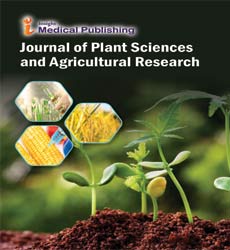Therapeutic Potentials of Medicinal Plants in Treating Neurodegenerative Disorders
Banakar Yang*
Department of Agricultural Sciences, University of Helsinki, Helsinki, Finland
- *Corresponding Author:
- Banakar Yang
Department of Agricultural Sciences, University of Helsinki, Helsinki,
Finland,
E-mail: yangb@gmail.com
Received date: November 26, 2024, Manuscript No. IPJPSAR-24-20185; Editor assigned date: November 28, 2024, PreQC No. IPJPSAR-24-20185 (PQ); Reviewed date: December 12, 2024, QC No. IPJPSAR-24-20185; Revised date: December 19, 2024, Manuscript No. IPJPSAR-24-20185 (R); Published date: December 26, 2024, DOI: 10.36648/ipjpsar.8.4.164
Citation: Yang B (2024) Therapeutic Potentials of Medicinal Plants in Treating Neurodegenerative Disorders. J Plant Sci Agri Res Vol.8 No.4: 164.
Description
Neurodegenerative disorders, such as Alzheimer's disease, Parkinson's disease, Huntington's disease and Amyotrophic Lateral Sclerosis (ALS), are progressive conditions that involve the degeneration of the nervous system, particularly the brain and spinal cord. These diseases lead to a gradual decline in cognitive and motor functions, significantly affecting the quality of life and increasing the burden on caregivers and healthcare systems. While there is no definitive cure for most neurodegenerative diseases, conventional treatments mainly focus on alleviating symptoms and slowing disease progression. In recent years, there has been growing interest in exploring the therapeutic potentials of medicinal plants as alternative or complementary treatments for these debilitating disorders.
Neurodegenerative disorders
Medicinal plants have been used for centuries in traditional medicine systems worldwide, offering a wealth of bioactive compounds with potential therapeutic effects. Many of these plants contain antioxidants, anti-inflammatory agents, neuroprotective compounds and other bioactive molecules that may play an important role in the prevention and treatment of neurodegenerative diseases. The medicinal properties of plants are being investigated for their ability to counteract the pathological processes associated with neurodegeneration, including oxidative stress, inflammation, protein aggregation and mitochondrial dysfunction.
One of the most studied medicinal plants in the context of neurodegenerative diseases is Ginkgo biloba. Known for its cognitive-improving properties, Ginkgo biloba has been widely researched for its potential benefits in Alzheimer's disease and other forms of dementia. The active compounds in Ginkgo biloba, particularly flavonoids and terpenoids, possess antioxidant and anti-inflammatory effects, which can protect neuronal cells from oxidative damage and reduce neuro inflammation, both of which are implicated in the pathogenesis of Alzheimer's disease. Some clinical studies have shown that Ginkgo biloba extract may help improve memory, cognitive function and quality of life in patients with mild to moderate Alzheimer's disease, although more rigorous research is needed to confirm its effectiveness.
Another medicinal plant with potential therapeutic benefits for neurodegenerative diseases is turmeric. The active compound in turmeric, curcumin, has been widely studied for its anti-inflammatory, antioxidant and neuroprotective properties. Curcumin is thought to exert its effects by reducing oxidative stress, inhibiting the accumulation of toxic proteins (such as beta-amyloid plaques in Alzheimer's disease) and modulating signaling pathways involved in neuronal survival and regeneration. Several animal studies and preliminary human trials suggest that curcumin may help slow the progression of Alzheimer's disease and improve cognitive function, although its low bioavailability remains a challenge in achieving therapeutic concentrations in the brain.
Bacopa monnieri, commonly known as Brahmi, is another plant used in traditional medicine for cognitive enhancement and neuroprotection. It has been studied for its ability to improve memory, learning and concentration, making it a good candidate for treating neurodegenerative conditions such as Alzheimer's and Parkinson's diseases. The active compounds in Bacopa monnieri, such as bacosides, have been shown to possess antioxidant, anti-inflammatory and neuroprotective effects. These compounds may help repair damaged neurons, promote the growth of new neurons (neurogenesis) and reduce the accumulation of amyloid plaques in the brain, which are characteristic of Alzheimer's disease. Some clinical studies have demonstrated the potential of Bacopa monnieri to enhance cognitive function in both healthy individuals and those with mild cognitive impairment.
Medicinal plants for neurodegenerative disorders
While medicinal plants offer good therapeutic potential for treating neurodegenerative disorders, several challenges remain in translating these traditional remedies into mainstream medical treatments. One of the main obstacles is the lack of standardized formulations and dosages. Medicinal plants contain complex mixtures of bioactive compounds, which can vary depending on factors such as plant species, geographic location, harvesting methods and processing techniques. This variability makes it difficult to ensure consistent therapeutic effects and safety profiles across different preparations.
Additionally, many of the bioactive compounds in medicinal plants have low bioavailability, meaning that they are not easily absorbed or transported to the brain in sufficient concentrations. Researchers are exploring various strategies, such as the use of nanotechnology or advanced drug delivery systems, to improve the bioavailability and targeted delivery of these compounds to the brain. For instance, curcumin's poor bioavailability has led to the development of nanoparticle formulations that can enhance its absorption and increase its therapeutic potential.
Another challenge is the limited clinical evidence supporting the use of medicinal plants in treating neurodegenerative diseases diseases. While many preclinical studies and animal models show good results, the evidence from human clinical trials is often inconclusive or inconsistent. More rigorous, large-scale clinical studies are needed to evaluate the efficacy, safety and optimal dosages of medicinal plants for treating neurodegenerative disorders. It is also important to assess the potential interactions between medicinal plants and conventional drugs used in the treatment of these conditions, as some herbs may interfere with the pharmacokinetics or pharmacodynamics of prescription medications.
Open Access Journals
- Aquaculture & Veterinary Science
- Chemistry & Chemical Sciences
- Clinical Sciences
- Engineering
- General Science
- Genetics & Molecular Biology
- Health Care & Nursing
- Immunology & Microbiology
- Materials Science
- Mathematics & Physics
- Medical Sciences
- Neurology & Psychiatry
- Oncology & Cancer Science
- Pharmaceutical Sciences
